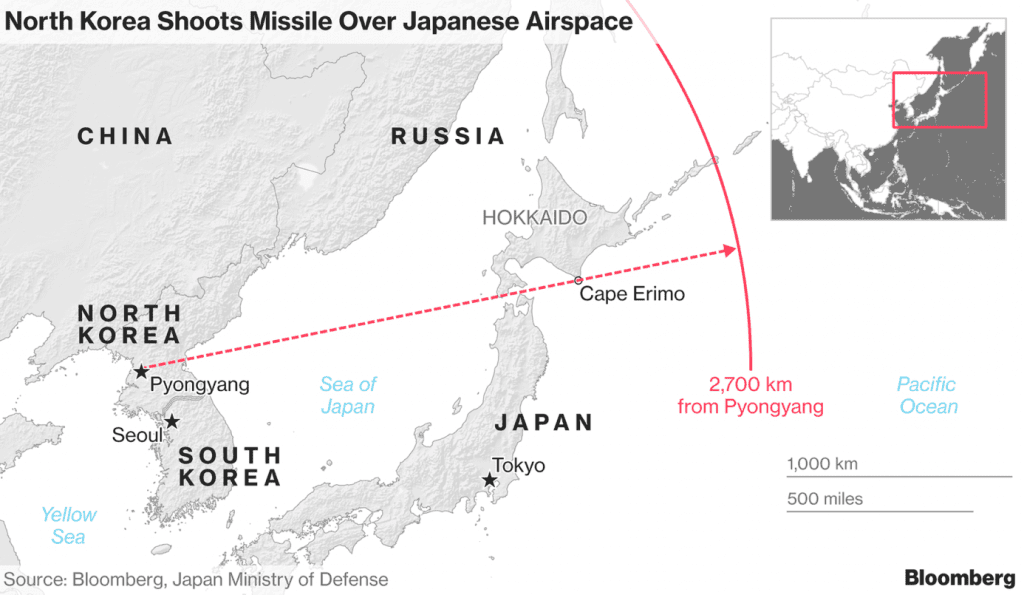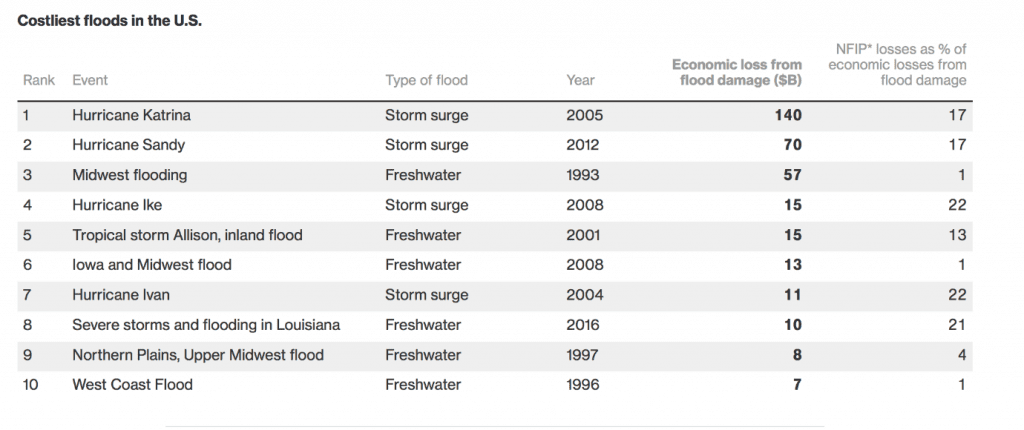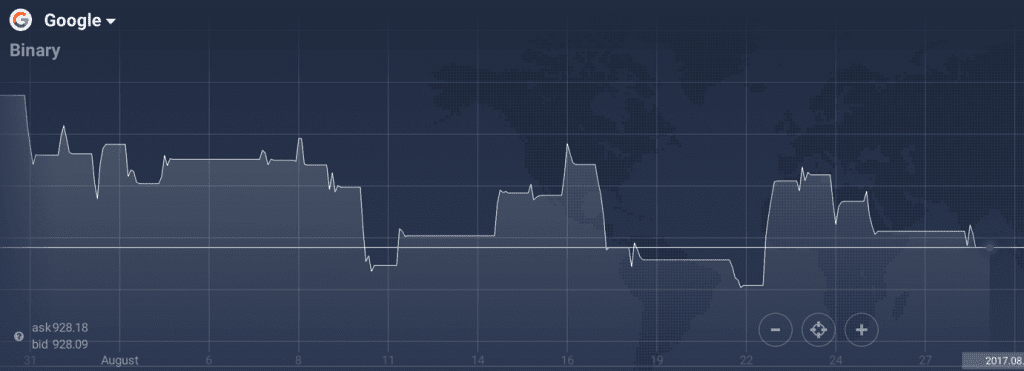The missile landed in the Pacific Ocean about 1,200 kilometers east of Japan’s northern island of Hokkaido, a government official told reporters. South Korean President ordered a show of force in response, with four F-15K jet fighters conducting bomb-dropping drills. “A missile passing over Japan is an unprecedented, grave and serious threat,” Prime Minister Shinzo Abe told reporters in Tokyo. Abe said he spoke with President Donald Trump for 40 minutes, and they agreed to increase pressure on North Korea. He also called for China and Russia to take action. There was no immediate statement from the White House or Trump tweet after the launch.

It was the first North Korean projectile to fly over Japanese airspace since the regime launched a rocket in 2016, and undermines nascent hopes for dialogue with North Korea. That’s after tensions had appeared to cool following a war of words between Trump and Kim earlier this month. With sanctions having little impact and any war likely to be catastrophic, the U.S. and its allies have few good options to stop Kim from obtaining the capability to hit North America with a nuclear weapon. Expect more volatility in the market.
Majority of Harvey Flood Victims Uninsured, Face Big Bills Alone
Homeowners suffering flood damage from Harvey are more likely to be on the hook for losses than victims of prior storms — a potentially crushing blow to personal finances and neighbourhoods along the Gulf Coast. Insurance experts say only a small fraction of homeowners in Harvey’s path of destruction have flood insurance. That means families with flooded basements, soaked furniture and water-damaged walls will have to dig deep into their pockets or take on more debt to fix up their homes. Some may be forced to sell, if they can, and leave their communities.

“All these people taken out in boats, they have a second problem: They have no insurance,” said an Expert. Harvey made landfall in Texas late Friday as a Category 4 hurricane and has lingered off the coast, dropping heavy rain as a tropical storm. Hunter expects flood damage alone from the storm to cost at least $35 billion, about what Katrina cost. But in that 2005 hurricane about half of flooded homes were covered by flood insurance. With Harvey, only two of 10 homeowners have coverage, Hunter estimates. Good news for insurance companies.
Attack on Walmart: Amazon Cuts Whole Foods Prices 43% on First Day
Amazon spent its first day as the owner of a brick-and-mortar grocery chain cutting prices at Whole Foods Market as much as 43 percent. In a sign of how the retailer is changing, the Amazon Echo, a voice-activated electronic assistant, was also for sale, for $99.99 — a sharp pivot into electronics for a company known for kale and quinoa. The Echo Dot, a smaller version, was advertised for $44.99. The tech giant’s $13.7 billion purchase of Whole Foods has sent shock waves through the already changing $800 billion supermarket industry. The wedding between Amazon and the upscale grocery promises to upend the way customers shop for groceries. Cutting prices at the chain with such an entrenched reputation for high cost that its nickname is Whole Paycheck is a sign that Amazon is serious about taking on competitors such as Wal-Mart Stores, Kroger Co. and Costco.
Google vs. EU
Google today faces a deadline to tell the European Union how it plans to comply with an order to stop discriminating against rival shopping search services under threat of new fines that would add to a record 2.4 billion-euro penalty. The EU gave the Alphabet Inc. unit 60 days to propose how it would “stop its illegal content” and 90 days to make changes to how the company displays shopping search results when users start seeking a product.

Those changes need to be put in place by Sept. 28 to stave off a risk that the EU could fine the company 5 percent of daily revenue for each day it fails to comply. “The obligation to comply is fully Google’s responsibility,” the European Commission said in an emailed statement, without elaborating on what the company must do to comply. Google declined to comment. The onus is on Google to find a solution that satisfies regulators, who’ve learned from past battles with Microsoft and Intel. Microsoft’s failure to obey a 2004 antitrust order and charge reasonable fees for software licenses saw it fined 899 million euros four years later. Microsoft argued that its prices were fair and it shouldn’t be compelled to give away patented innovation.
Intel’s lawyer said in 2009 that he was “mystified” on what regulators wanted the company to do to comply with an order to halt anti-competitive rebates for chip sales to computer makers. Intel may finally receive clarity when the EU’s top court rules on its legal challenge to a 1.06 billion euro fine on Sept. 6. The EU now has a month to check if Google’s planned changes will fit the bill. Regulators are also expected to levy fines in separate investigations into Google’s Android mobile-phone software — possibly later this year — and the AdSense advertising service. Margrethe Vestager, the EU’s antitrust chief, has also threatened further probes on travel or map services. Time to short?
Important economic events:
12.30am – Japan unemployment (July): expected to remain at 2.8% YoY. Market to watch: Yen crosses
7am – Germany GfK consumer confidence (September): forecast to fall to 10.7 from 10.8. Market to watch: EUR crosses
3pm – US Conference Board consumer confidence (August): expected to fall to 120 from 121. Markets to watch: US indices, USD crosses

